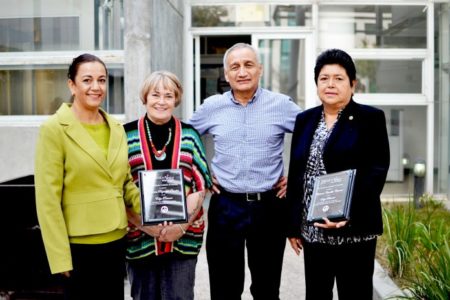
Share On Social!
Do you get enough sleep?
If not, your lack of shut-eye could be harming your health.
In fact, for Latinos, lack of sleep contributes to heart attacks, obesity, and other big health issues.

That’s where the “Los trastornos del sueño y la promoción del sueño saludable” (the sleep disorders and the promotion of a healthy sleep) program comes in.
Los trastornos del sueño trains community health workers, called promotores, to teach people about the importance of sleep.
The program’s 600 promotores—300 in the U.S. and 300 in Mexico—teams up with nurses and clinicians to deliver bilingual and culturally relevant education to improve sleep habits. This helps reduce health care needs for sleep apnea, insomnia, and restless legs syndrome.
Now they’ve won an award for their work
Los trastornos del sueño has been named an Edge Runner by the American Academy of Nursing.
The award highlights program creators—Dr. Luxana Reynaga Ornelas and registered nurse Cipriana Caudillo Cisneros of University of Guanajuato, and Dr. Carol Baldwin of Arizona State University’s College of Nursing & Health Innovation. They have “designed innovative models of care or interventions which improve health, impact cost and influence policy.”
The program saved $3.5 million for the cost of caring for sleep apnea, insomnia, and restless legs syndrome along the U.S.-Mexico border from 2014-2017.
“By identifying the need for a Spanish-language sleep program and educating promotores to help in its delivery, [the program and its creators] demonstrate how nursing innovation successfully addresses everyday health challenges,” said Dr. Karen Cox of the American Academy of Nursing. “This program shines a light on both the importance of sleep health and the need for culturally congruent care.”
Explore More:
Mental HealthBy The Numbers
22
percent
of Latino youth have depressive symptoms, more than any other group besides Native American youth




I know this is a two year old article, but Bias is another reason why some Hispanic people think about or attempt suicide. I’m actually part Filipino, German and English and I ended up looking stereotypically Hispanic and my surname is Spanish due to my Filipino side since the Spanish colonized the Philippines. I’m a woman though and I’ve thought about it for a number of reasons involving my health from a rare disorder that caused learning issues and also I have obvious cancer symptoms Ive tried getting help with. I’ve also been treated poorly and sometimes in very scary situations because of obvious Bias and Prejudice due to my appearance. I’m just saying Bias against people who are Hispanic and “look Hispanic” is a real thing. I apologize if it was in this article but I didn’t notice it, But I do apologize if its in there. I just think it needs to be addressed more. Thank You